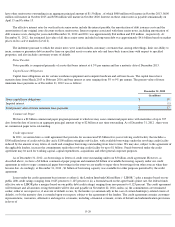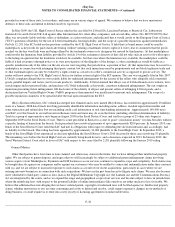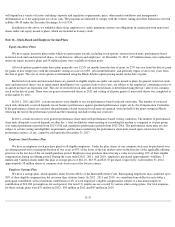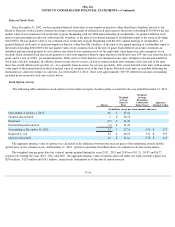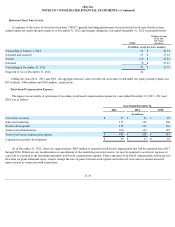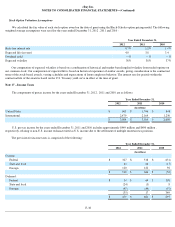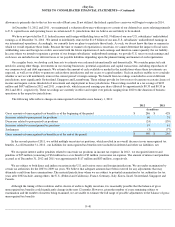eBay 2012 Annual Report Download - page 128
Download and view the complete annual report
Please find page 128 of the 2012 eBay annual report below. You can navigate through the pages in the report by either clicking on the pages listed below, or by using the keyword search tool below to find specific information within the annual report.
eBay Inc.
NOTES TO CONSOLIDATED FINANCIAL STATEMENTS—(Continued)
From time to time, we are involved in other disputes or regulatory inquiries that arise in the ordinary course of business, including suits by
our users (individually or as class actions) alleging, among other things, improper disclosure of our prices, rules or policies, that our prices, rules,
policies or customer/user agreements violate applicable law, or that we have not acted in conformity with such prices, rules, policies or
agreements. The number and significance of these disputes and inquiries are increasing as our company has grown larger, our businesses have
expanded in scope (both in terms of the range of products and services that we offer and our geographical operations) and our products and
services have increased in complexity. Any claims or regulatory actions against us, whether meritorious or not, could be time consuming, result
in costly litigation, damage awards (including statutory damages for certain causes of action in certain jurisdictions), injunctive relief or
increased costs of doing business through adverse judgment or settlement, require us to change our business practices in expensive ways, require
significant amounts of management time, result in the diversion of significant operational resources or otherwise harm our business.
Indemnification Provisions
In the ordinary course of business, we have included limited indemnification provisions in certain of our agreements with parties with
which we have commercial relations, including our standard marketing, promotions and application-programming-interface license agreements.
Under these contracts, we generally indemnify, hold harmless and agree to reimburse the indemnified party for losses suffered or incurred by the
indemnified party in connection with claims by a third party with respect to our domain names, trademarks, logos and other branding elements to
the extent that such marks are applicable to our performance under the subject agreement. In certain cases, we have agreed to provide
indemnification for intellectual property infringement. GSI has provided in many of its major ecommerce agreements an indemnity for other
types of third-party claims, which are indemnities mainly related to various intellectual property rights, and we have provided similar
indemnities in a limited number of agreements for our other businesses. In our PayPal business, we have provided an indemnity to our payment
processors in the event of certain third-party claims or card association fines against the processor arising out of conduct by PayPal or PayPal
customers. PayPal has also provided a limited indemnity to merchants using its retail point of sale payment services. It is not possible to
determine the maximum potential loss under these indemnification provisions due to our limited history of prior indemnification claims and the
unique facts and circumstances involved in each particular provision. To date, losses recorded in our statement of income in connection with our
indemnification provisions have not been significant, either individually or collectively.
Off-Balance Sheet Arrangements
As of December 31, 2012 , we had no off-balance sheet arrangements that have, or are reasonably likely to have, a current or future
material effect on our consolidated financial condition, results of operations, liquidity, capital expenditures or capital resources.
In Europe, we have two cash pooling arrangements with a financial institution for cash management purposes. These arrangements allow
for cash withdrawals from this financial institution based upon our aggregate operating cash balances held in Europe within the same financial
institution (“Aggregate Cash Deposits”). These arrangements also allow us to withdraw amounts exceeding the Aggregate Cash Deposits up to
an agreed-upon limit. The net balance of the withdrawals and the Aggregate Cash Deposits are used by the financial institution as a basis for
calculating our net interest expense or income. As of December 31, 2012 , we had a total of $5.5 billion in cash withdrawals offsetting our $5.5
billion in Aggregate Cash Deposits held within the same financial institution under these cash pooling arrangements.
Based on differences in regulatory requirements and commercial law in the jurisdictions where PayPal operates, PayPal previously held
customer balances either as direct claims against PayPal or as an agent or custodian on behalf of PayPal's customers. These off-balance sheet
funds totaled approximately $2.7 billion as of December 31, 2011, and included funds held on behalf of U.S. customers that were deposited in
bank accounts insured by the Federal Deposit Insurance Corporation (subject to applicable limits).
In 2012, PayPal's California regulator, the California Department of Financial Institutions, notified PayPal that PayPal's practice of holding
the funds underlying U.S. customer balances as an agent on behalf of its customers, rather than as owner of those funds, meant that PayPal could
not treat those funds as liquid assets for purposes of the liquidity rules applicable to California money transmitter licensees. Based on changes to
our U.S. PayPal user agreement effective November 1, 2012, PayPal began holding U.S. customer balances as direct claims against PayPal,
rather than as an agent or custodian on behalf of such PayPal customers. As a result, effective November 1, 2012, all U.S. PayPal customer
balances, which were previously not reported on our consolidated balance sheet, have been reflected as assets in our consolidated balance sheet
under “Funds
F-33








